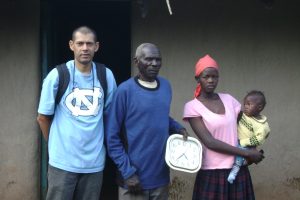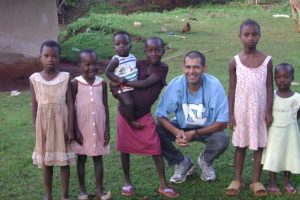
Kenya’s national poverty alleviation program leads teens to delay sexual activity. Because age of sexual debut is a known risk factor for HIV infection, these large-scale programs could have a spillover impact on HIV prevention, according to the results of a study by UNC researchers.
The Kenya Cash Transfer for Orphans and Vulnerable Children (Kenya CT-OVC) program reaches nearly 150,000 households across the country. Eligibility is based on poverty and having at least one child below age 18. Families are provided a flat monthly allowance of approximately $20, paid directly to the caregiver, with no conditions attached to the transfer except that the money be used for the care and support of children.
The study, which appears in the journal PLOS ONE, found that the Kenya cash transfer program reduces the probability of sexual debut among young people ages 15 to 25 by 23 percent.
“This is big news because it suggests that mainstream policies to mitigate poverty can also affect the spread of HIV,” said Sudhanshu Handa, chair of the public policy department in UNC’s College of Arts and Sciences and a Carolina Population Center fellow.
There are several reasons why a poverty-targeted cash transfer program may delay sexual debut among teens. According to the study, the cash transfers can increase school enrollment and attainment, which can reduce HIV-related risky behavior. School attendance may also increase exposure to HIV education.

Another pathway through which cash transfer programs may delay sexual debut is through increased economic well-being. Young people of lower economic status may be more likely to engage in transactional sex (for goods such as food, housing, social status or money), increasing their HIV risk.
The study results are encouraging because the Kenya CT-OVC program is similar in design and approach to many other national cash transfer programs, which means the results from Kenya may be applicable for other programs across Africa, Handa added.
“And because many of these programs are unconditional, that has the added benefit of making them easier to implement,” he said.
The study was funded by the U.S. National Institute of Mental Health.
Handa’s UNC co-authors, all from the Gillings School of Global Public Health and Carolina Population Center fellows are Carolyn Tucker Halpern, Audrey Pettifor and Harsha Thirumurthy.
Handa is a former social policy adviser for UNICEF’s Eastern and Southern Africa regional office in Nairobi, Kenya. His areas of research focus are poverty, population and human resource economics, social policy and safety nets, and applied development microeconomics.



